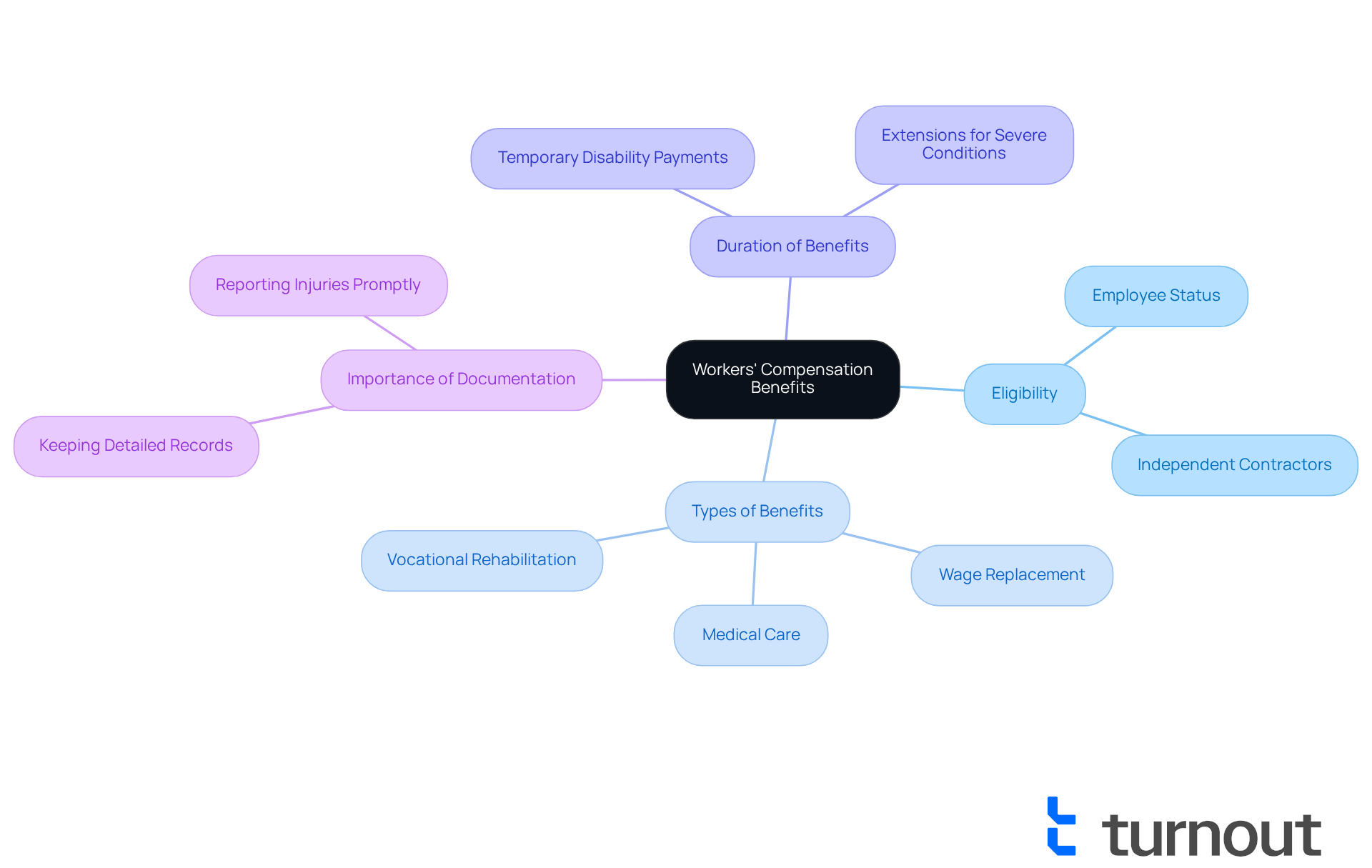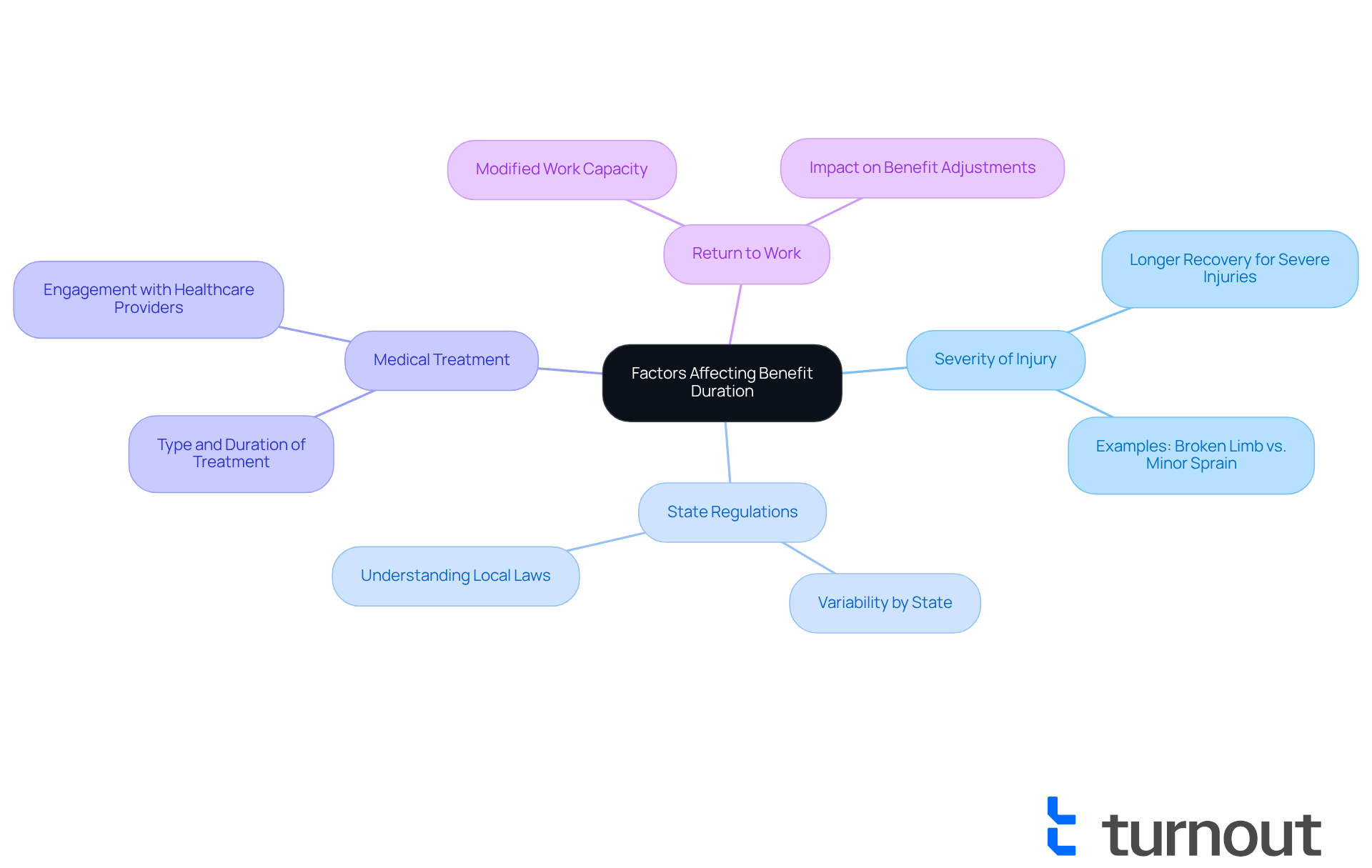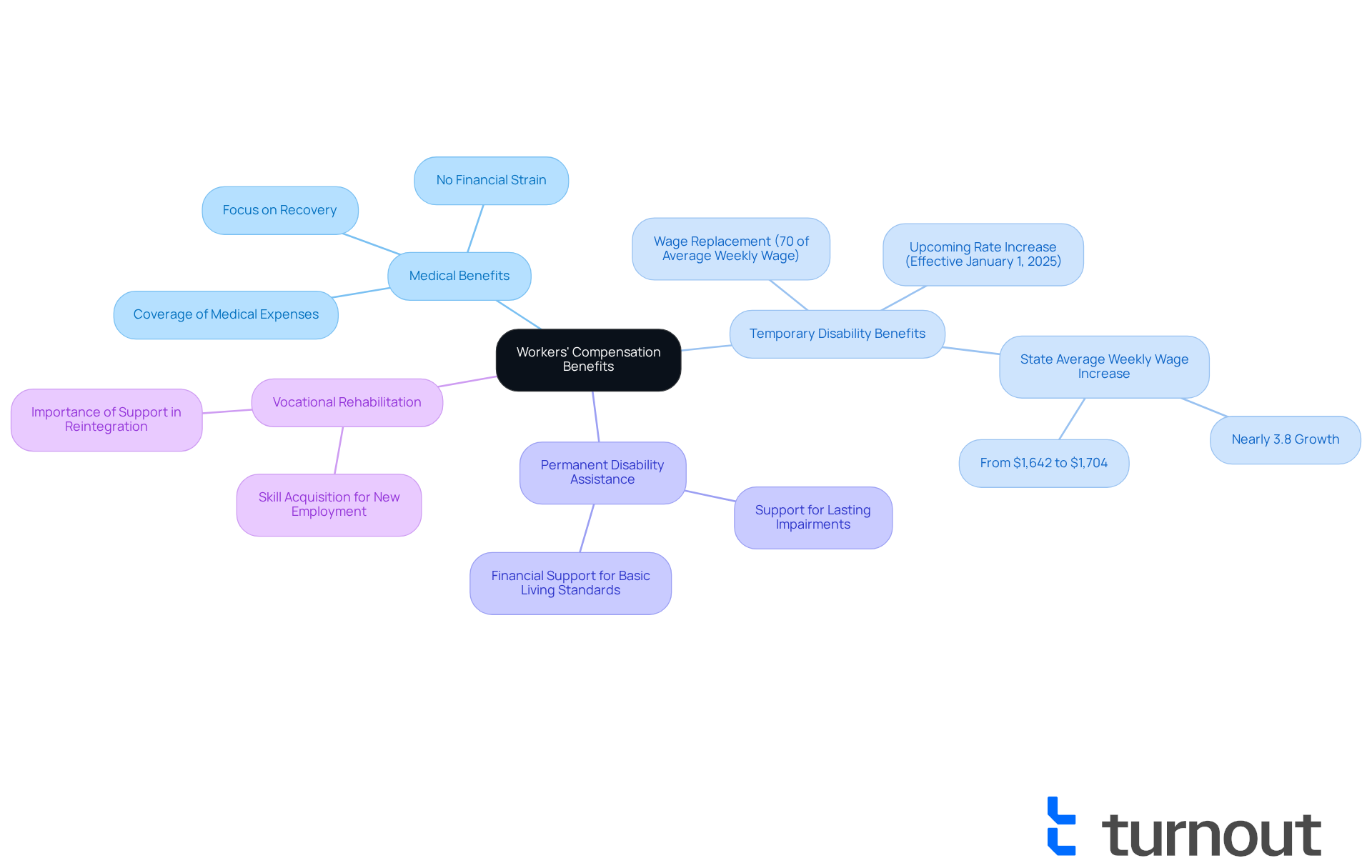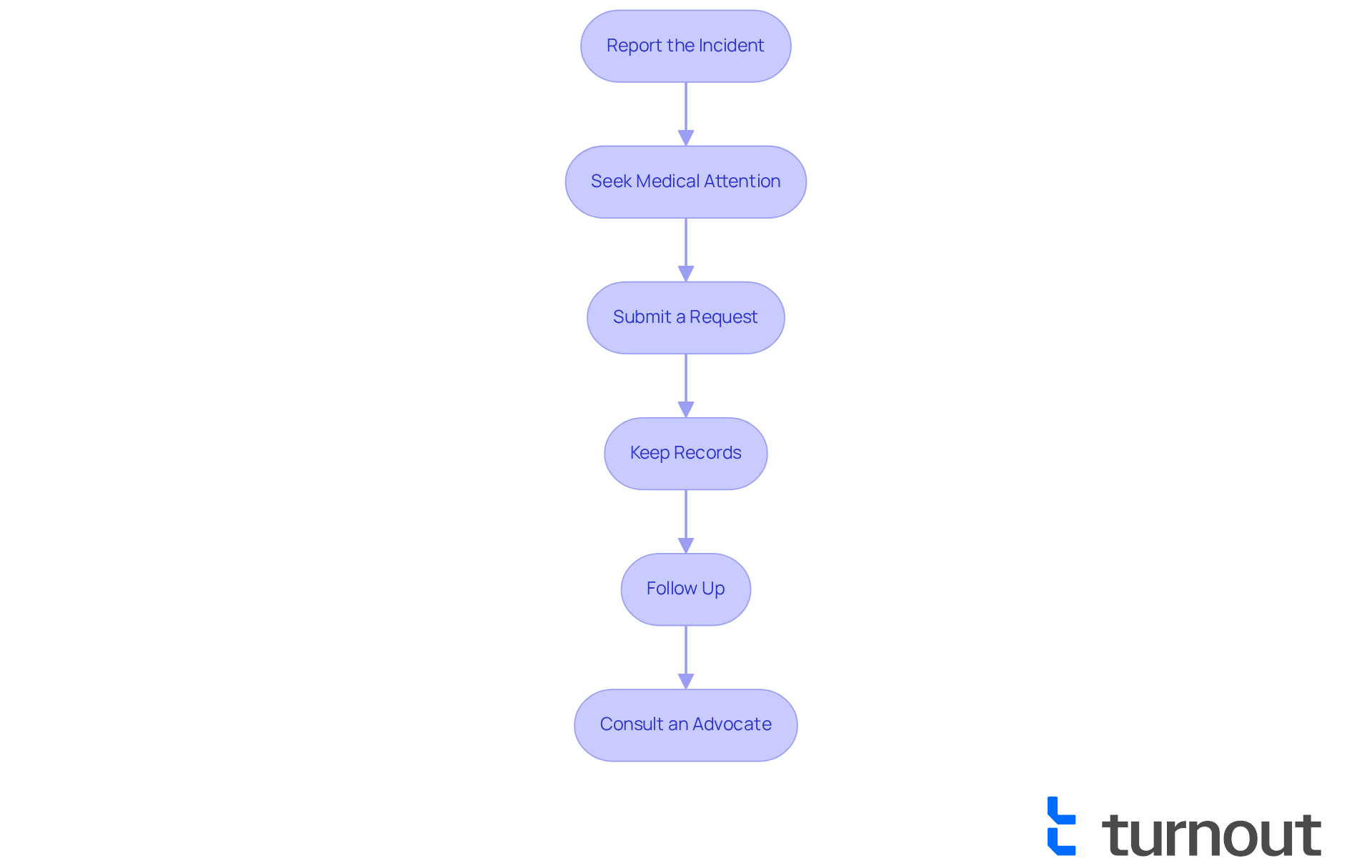Overview
Navigating the complexities of workers' compensation benefits can be overwhelming, especially when you are dealing with the aftermath of an injury. We understand that the duration of these benefits can vary significantly based on the severity of your injury, state regulations, and the type of medical treatment you may need.
For instance, in California, temporary disability payments can last up to 104 weeks within five years from the date of the incident.
It's crucial to recognize the importance of understanding specific state laws. Keeping detailed documentation can be a vital step in effectively navigating the claims process.
Remember, you are not alone in this journey. We’re here to help you through the process, ensuring that you receive the support you deserve.
Introduction
Navigating the complex landscape of workers' compensation can feel overwhelming, especially for those recovering from job-related injuries. We understand that this essential safety net is designed to provide financial relief, covering medical expenses and lost wages. However, the intricacies of eligibility and benefit duration can leave many feeling uncertain.
What factors determine how long these benefits last? How can injured workers ensure they receive the support they deserve?
This guide delves into the key aspects of workers' compensation, offering clarity on benefit types and duration. We aim to empower you with the crucial steps to effectively manage your claims, helping you take charge of your recovery journey. Remember, you're not alone in this process, and we're here to help you every step of the way.
Understand Workers' Compensation Benefits
Workers' compensation assistance is designed to provide crucial financial support to employees facing injuries or illnesses related to their jobs. This support typically covers medical expenses, rehabilitation costs, and a portion of lost wages. Understanding these benefits is the first step in effectively managing your claim. Let’s explore some key points together:
- Eligibility: Most employees are eligible for workers' compensation if they are injured while performing job-related duties. However, it’s important to note that independent contractors may not qualify for these benefits, which is a vital distinction to understand.
- Types of Benefits: Benefits can encompass medical care, wage replacement, and vocational rehabilitation, which assists injured workers in returning to the workforce. The specifics of these benefits may vary based on state regulations and the nature of the injury.
The duration of benefits, specifically regarding workers compensation how long does it last, can differ depending on the severity of the condition and applicable state laws. For example, California's 5-year regulation addresses workers compensation how long does it last, allowing injured individuals to receive temporary disability payments for up to 104 weeks within five years from the date of the incident, with extensions available for serious conditions. Additionally, the 90-day rule states that an employer's insurance provider has 90 days to review and decide on a compensation claim.
It's also essential to keep detailed records of work-related injuries, as this documentation is crucial for supporting your case. Staying informed about changes in compensation regulations and seeking guidance can significantly improve your chances of obtaining the support you deserve. As labor law experts emphasize, understanding your rights and the claims process is key to navigating the complexities of compensation effectively. Moreover, with potential policy changes influenced by the political landscape, being proactive in your approach is more important than ever. Remember, you're not alone in this journey—we're here to help you every step of the way.

Identify Factors Affecting Benefit Duration
Several factors can affect workers compensation how long does it last, and understanding these can help you navigate your situation with confidence.
- Severity of Injury: More severe injuries typically result in longer benefit durations. For instance, a broken limb may require more time off work than a minor sprain. It’s important to recognize how this can impact your recovery.
- State Regulations: Each state has its own laws regulating workers' compensation, including the duration of assistance. Familiarizing yourself with your state's specific regulations can empower you to make informed decisions.
- Medical Treatment: The kind and duration of medical treatment required can also affect the duration of assistance. Continuous treatment may prolong the duration you receive support, so it’s vital to stay engaged with your healthcare provider.
- Return to Work: If you can resume work in a modified capacity, your assistance may be adjusted accordingly. We understand that returning to work can be a significant step in your recovery journey.
Comprehending these elements will assist you in predicting workers compensation how long does it last for receiving support. Remember, you're not alone in this journey. We're here to help you strategize your forthcoming actions and ensure you receive the care you deserve.

Explore Types of Workers' Compensation Benefits
Workers' compensation benefits encompass several essential categories designed to support injured employees. We understand that navigating this system can be overwhelming, but knowing your options can make a significant difference in your recovery journey.
-
Medical Benefits: These benefits cover all necessary medical expenses related to the injury, including hospital visits, surgeries, and rehabilitation. In New Jersey, for example, medical assistance guarantees that injured individuals obtain the essential care without financial strain, enabling them to concentrate on healing.
-
Temporary Disability Benefits: This category offers wage replacement for employees who are temporarily unable to work due to their condition, typically calculated at 70% of the average weekly wage. With the upcoming increase in assistance rates effective January 1, 2025, workers can expect adjustments that reflect the new minimum and maximum thresholds. The State Average Weekly Wage (SAWW) has risen from $1,642 to $1,704, indicating a nearly 3.8% growth, which can provide much-needed support during your recovery.
-
Permanent Disability Assistance: If a harm leads to a lasting impairment, individuals may qualify for continuous support. This ensures that those who suffer long-term effects from their injuries receive the financial support they need to maintain a basic standard of living. You are not alone in this journey; help is available.
-
Vocational Rehabilitation: For those unable to return to their previous job, this benefit assists in acquiring new skills or finding alternative employment. Vocational rehabilitation specialists highlight the significance of this support, stating that it plays a crucial role in assisting injured individuals to reintegrate into the workforce. As one expert observed, 'The appropriate assistance can significantly impact an injured individual's recovery and return to employment.'
Comprehending these types of benefits, particularly workers compensation how long does it last, is essential for navigating the compensation system effectively. By being aware of the available support regarding workers compensation how long does it last, injured individuals can pursue all avenues for assistance, ensuring they receive the help they require during their recovery. It's common to feel uncertain after an accident, but it is essential for harmed individuals to inform their employers quickly to streamline the compensation process and prevent possible obstacles like denial of benefits or inadequate medical documentation. Remember, we're here to help you through this.

Follow Steps to Manage Your Workers' Compensation Claim
To effectively manage your workers' compensation claim, it’s important to follow these essential steps:
-
Report the Incident: We understand that experiencing an incident can be overwhelming. Inform your employer about the situation as soon as possible, as this is often a prerequisite for submitting a request. In Texas, for instance, you must report work-related injuries within 30 days to comply with state regulations.
-
Seek Medical Attention: Your health is a priority. Obtain the necessary medical treatment and ensure that all medical records are thoroughly documented. This documentation is essential for your request.
-
Submit a Request: Take a moment to complete the necessary paperwork for your workers' compensation request. Be meticulous and precise to prevent setbacks; requests may be rejected if the incident is considered unrelated to work or if the paperwork is inadequate.
-
Keep Records: Maintaining detailed records of all communications, medical treatments, and expenses related to your injury is crucial. This will help ensure honesty in your workplace incident report and strengthen your claim.
-
Follow Up: It's common to feel anxious during this process. Keep in touch with your employer and the compensation insurance provider to monitor the progress of your request. Employers have 10 days to report the incident to the Workers' Compensation Commission after you report it. If you do not receive updates, consider submitting a request to the relevant compensation board.
-
Consult an Advocate: If you encounter challenges, remember that you are not alone. Seek assistance from a qualified advocate who can help navigate the complexities of the system. Many supporters offer complimentary consultations, which can be especially beneficial if your request is rejected or if you face difficulties in securing assistance.
By adhering to these steps, you can manage your compensation process and strive to obtain the support you are entitled to. Remember, timely reporting and thorough documentation are key to a successful claim process. Additionally, failing to follow state-specific procedures may result in loss of benefits. Understanding that workers' compensation is a no-fault system means you do not need to prove employer negligence to receive benefits. We're here to help you through this journey.

Conclusion
Understanding the intricacies of workers' compensation is essential for employees facing the challenges of job-related injuries or illnesses. This system not only provides financial support for medical expenses and lost wages but also plays a crucial role in facilitating recovery and reintegration into the workforce. By familiarizing yourself with eligibility criteria, benefit types, and the duration of assistance, you can better advocate for your needs and ensure you receive the necessary support during these difficult times.
We recognize that navigating this process can be overwhelming. Key arguments outlined in this article highlight the importance of acknowledging the various factors that influence the duration of benefits, such as:
- The severity of injuries
- State regulations
- Medical treatment requirements
Additionally, understanding the steps to effectively manage a workers' compensation claim—from reporting incidents to seeking medical attention and maintaining thorough records—is vital for a successful outcome. This knowledge not only empowers injured workers but also reinforces the notion that you are not alone in your journey toward recovery.
As we conclude, being proactive and informed about workers' compensation can significantly impact your recovery experience. As policies evolve and new trends emerge in 2025, staying updated on the latest regulations and benefit structures is crucial. We encourage you to take charge of your claims, seek assistance when needed, and remember that support is available every step of the way. Embracing this knowledge not only enhances your chances of receiving the benefits you deserve but also fosters resilience in the face of adversity.
Frequently Asked Questions
What are workers' compensation benefits designed to provide?
Workers' compensation benefits are designed to provide financial support to employees facing injuries or illnesses related to their jobs, covering medical expenses, rehabilitation costs, and a portion of lost wages.
Who is eligible for workers' compensation benefits?
Most employees are eligible for workers' compensation if they are injured while performing job-related duties. However, independent contractors may not qualify for these benefits.
What types of benefits are included in workers' compensation?
Workers' compensation benefits can include medical care, wage replacement, and vocational rehabilitation to assist injured workers in returning to the workforce. The specifics may vary based on state regulations and the nature of the injury.
How long do workers' compensation benefits last?
The duration of workers' compensation benefits can differ based on the severity of the condition and applicable state laws. For example, in California, benefits can last for up to 104 weeks within five years from the date of the incident, with extensions available for serious conditions.
What is the 90-day rule regarding workers' compensation claims?
The 90-day rule states that an employer's insurance provider has 90 days to review and decide on a workers' compensation claim.
Why is it important to keep detailed records of work-related injuries?
Keeping detailed records of work-related injuries is crucial for supporting your case and improving your chances of obtaining the benefits you deserve.
How can changes in compensation regulations affect my claim?
Staying informed about changes in compensation regulations and seeking guidance can significantly improve your chances of obtaining support, especially as potential policy changes may arise from the political landscape.
What should I do if I need help with my workers' compensation claim?
It's important to understand your rights and the claims process. Seeking help from experts can assist you in navigating the complexities of workers' compensation effectively.




